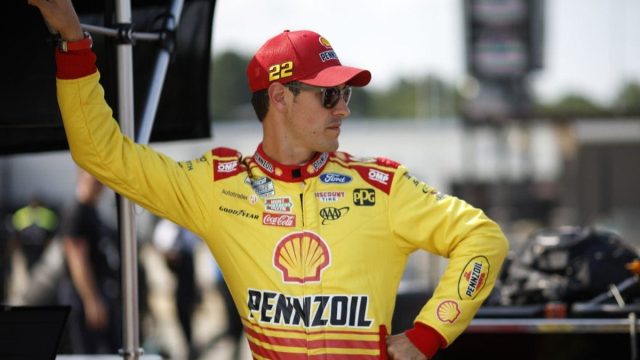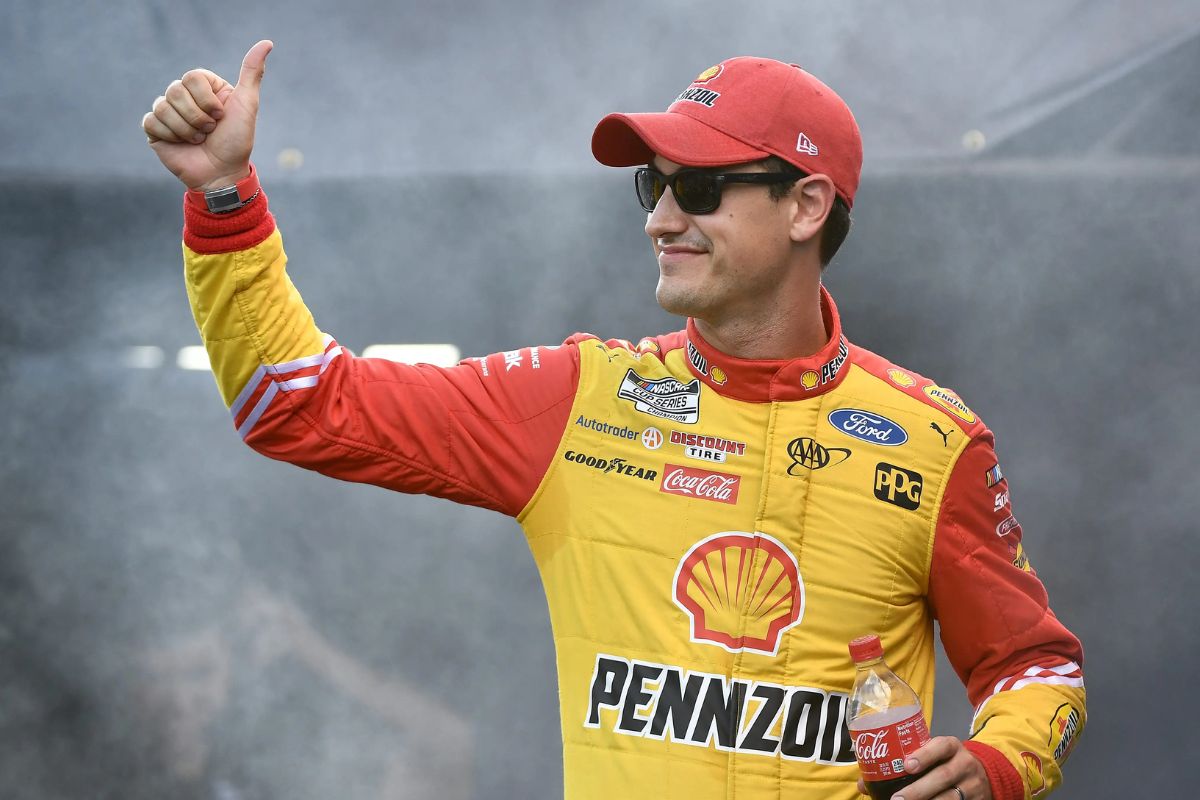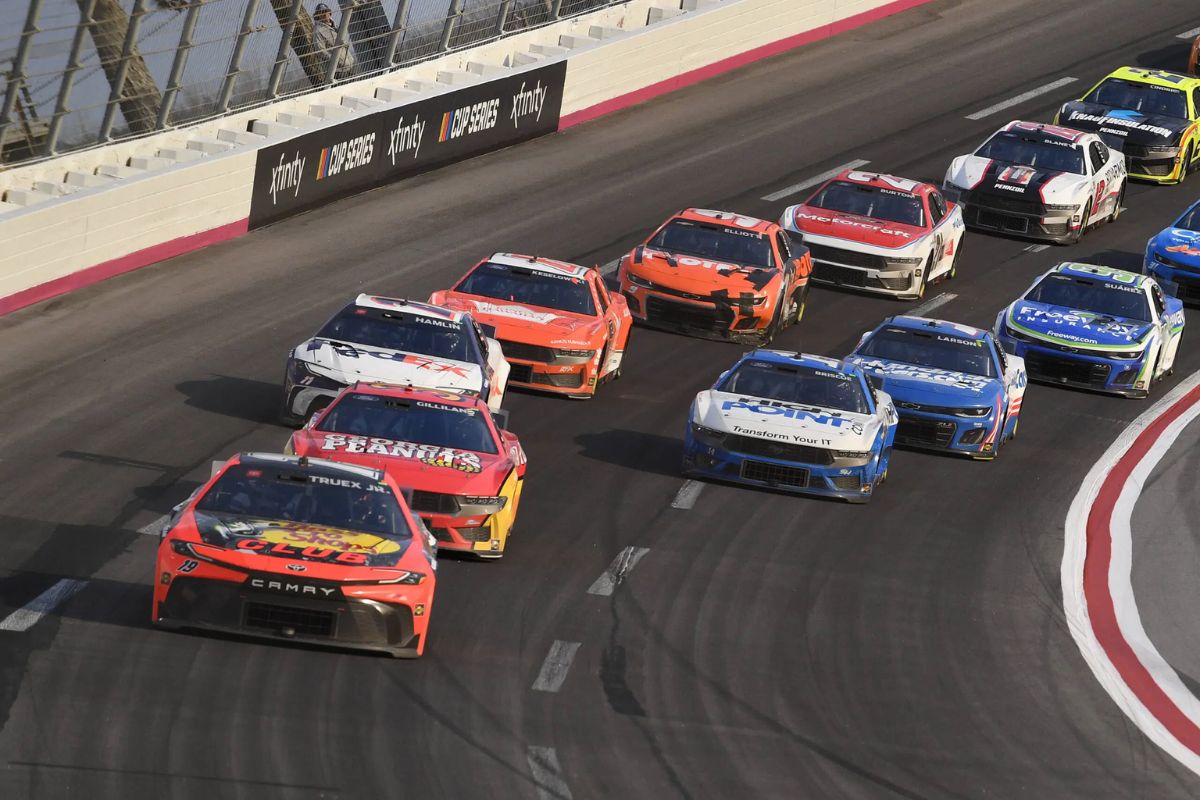Joey Logano on Austin Dillon’s Win at Richmond: Joey Logano‘s recent remarks labeling Austin Dillon‘s tactics as ‘chickenshit‘ following his contentious victory at Richmond Raceway shows deeper rift within NASCAR regarding competitive ethics. Logano’s frustration stems from Dillon’s aggressive tactics, which not only shifted the race’s outcome but also raised questions about the acceptable limits of racing strategy. This incident highlights the ongoing debate between aggression and integrity in the sport and sets the stage for potential repercussions in the playoff standings. How this evolving narrative will impact team dynamics and fan perceptions remains to be seen.
Key Highlights
- Joey Logano criticized Austin Dillon’s aggressive tactics, labeling them as ‘chickenshit’ in the aftermath of the controversial Richmond race.
- Dillon’s last-minute maneuvering altered the race outcome, causing emotional backlash from Logano and other competitors.
- The incident ignited discussions on racing ethics and accountability among NASCAR drivers and officials.
- Logano’s frustration reflects a growing tension within the sport regarding the balance between aggression and fair competition.
Controversial Victory at Richmond Raceway
The controversial win at Richmond Raceway, marked by a last-minute tactic from Austin Dillon, has ignited discussions among fans and analysts regarding the integrity of racing methods in the NASCAR Cup Series. This incident has raised pertinent questions about the ethical boundaries of competitive racing and the implications of calculated aggression on the sport’s image.
Dillon’s success, which came at the expense of Joey Logano‘s apparent superiority throughout the race, has drawn sharp criticism and divided opinions. Logano, who had been poised to secure the win until the final moments, openly expressed his discontent with Dillon’s aggressive tactics. His reaction not only emphasizes the emotional investment drivers have in their performances but also highlights the fine line between racing hard and crossing the threshold into unsportsmanlike conduct.
The aftermath of such actions often leads to scrutiny from NASCAR officials, as the governing body has a track record of enforcing regulations to maintain fair competition. The case of Bubba Wallace, who faced a hefty fine for a similar on-track incident, looms large in the discussion. This raises concerns about the consistency of NASCAR’s disciplinary measures and their effects on driver behavior moving forward.
How Austin Dillon Executed the Controversial Win
Austin Dillon’s bold tactics during the final laps of the race at Richmond ultimately transformed a precarious situation into a controversial victory, showing both calculated aggression and the considerable stakes of NASCAR competition. The tension peaked as a late caution flag propelled the race into overtime, setting the stage for a dramatic showdown.
Dillon, previously in the lead, executed a high-stakes maneuver that altered the race’s outcome. As the final lap unfolded, he tactically spun out Joey Logano, who had been leading, thereby opening the door for Dillon’s ascent. The ensuing chaos only amplified the stakes, as Dillon made contact with Denny Hamlin’s car, forcing him into the outside wall and solidifying Dillon’s controversial claim to the victory.
Logano and Hamlin show frustration to 3 crew.
Logano spins his tires as the team cheers. NASCAR officials unhappy with the move. #NASCAR pic.twitter.com/RWwK27z5vS
— Noah Lewis (@Noah_Lewis1) August 12, 2024
Key elements of Dillon’s execution include:
- Aggressive Restart: Seized the opportunity presented by the late caution to reclaim the lead.
- Decisive Contact: His spin on Logano was both intentional and tactical, showcasing a willingness to race aggressively.
- Managing Chaos: Dillon maintained composure amidst the turmoil, traversing the wreckage effectively.
The outcome left Logano reeling, ultimately finishing in 19th place. Dillon’s tactics, while effective, ignited a firestorm of debate regarding the ethics of competitive aggression in NASCAR, emphasizing the fine line between skill and controversy in the sport.
Joey Logano’s Reaction
Logano’s reaction to the controversial finish at Richmond revealed not only his frustration but also a deeper commentary on the competitive nature of NASCAR and the ethics of aggressive racing tactics. His use of terms like ‘chickenshit‘ to describe Austin Dillon’s action highlights a growing tension in the sport, where the lines between aggressive driving and unsportsmanlike conduct are increasingly blurred.
Logano articulated his feelings honestly, asserting that Dillon’s actions were not just a racing incident but a blatant disregard for fair competition. In his post-race remarks, Logano expressed indignation over Dillon’s approach, stating, ‘I beat him fair and square on the restart,’ suggesting that a victory should be earned through skill and strategy rather than reckless aggression.
“Obviously, he didn’t make the turn because he hit me and (Hamlin) was going to win the race, so he had no intention to race. I beat him fair and square on the restart and he just pulls a chicken shit move.” – Logano
This perspective sheds light on the broader implications of racing tactics, particularly as drivers navigate the fine line between competitive zeal and ethical racing. Logano’s assertion that Dillon ‘just drove through me’ reflects a sentiment shared by many in the racing community: that such aggressive moves jeopardize the integrity of the sport.
“It’s a bunch of BS. Not even freaking close. Bump-and-run, I get it, but he got in there and just drove through me. It’s ridiculous.” – Logano
Moreover, the reaction from fellow competitors, including Denny Hamlin, who echoed Logano’s concerns, highlights a collective awareness of the need for accountability in NASCAR. This incident serves as a significant moment, prompting discussions about the values that should govern on-track behavior.
“Obviously, he’s just not going to go far (in the postseason). You have to pay your dues back on stuff like that.” – Hamlin
As NASCAR continues to evolve, the dialogue surrounding aggressive tactics and their consequences will be essential in shaping the future of the sport.
Austin Dillon’s Perspective
Many within the racing community have noted that Austin Dillon’s unapologetic stance on his aggressive tactics at Richmond highlights a growing acceptance of cutthroat strategies in the pursuit of victory. Dillon’s assertion that he has no remorse for his actions reveals a mindset that prioritizes results over connections. His post-race comments reflect an understanding of the high-stakes nature of NASCAR, where winning often trumps ethical considerations.
“I felt like with two [laps] to go, we were the fastest car obviously at the straightway and wrecked the guy. I hate to do that but sometimes you just got to have it.” – Dillon
Dillon’s perspective can be broken down into several key points:
- Competitive Drive: He believes that seizing victory requires a willingness to make bold, sometimes controversial moves.
- Strategic Justification: Dillon rationalizes his actions by emphasizing the need to adapt and capitalize on opportunities, especially in the closing laps.
- Realities of the Sport: His attitude encapsulates a broader trend within NASCAR, where aggressive driving is increasingly seen as a necessary tactic to secure a win.
Dramatic Shift in the Playoff Picture
The recent developments in Richmond have not only highlighted the aggressive tactics of drivers like Austin Dillon but have also triggered a significant reshuffling in the playoff standings, intensifying the competition as the regular season approaches its finale. The ramifications of the race reverberate throughout the standings, with previously secure positions now under siege.
Notably, Martin Truex Jr.’s unexpected DNF has drastically reduced his buffer from +108 to +78 points above the playoff cutoff, raising alarms for his team. Meanwhile, Ty Gibbs, 60 points adrift in 15th, faces mounting stress as the prospect of new winners looms large in the remaining races. Bubba Wallace‘s consistent performance has propelled him into the 16th spot, but his slender margin leaves him vulnerable to challenges from below.
The narrowing margins emphasize the volatility inherent in the playoff landscape. With Ross Chastain and Chris Buescher lurking just three points shy of the cut line, the upcoming races will certainly be a battleground for these drivers, each vying to secure their passage into the postseason.
As the intensity escalates, questions arise: Will mere points suffice for bubble drivers, or must they secure victories to guarantee their playoff aspirations? The answers will unfold in the coming weeks, engaging fans and analysts similarly as the narrative of the season continues to evolve.
News in Brief: Joey Logano on Austin Dillon’s Win at Richmond
The escalating tensions between Joey Logano and Richard Childress Racing highlight a critical debate within NASCAR regarding the balance between aggressive racing tactics and the principles of fair competition.
Logano’s vehement criticism of Dillon’s methods emphasizes a broader concern among drivers about the integrity of the sport.
As NASCAR continues to evolve, the implications of such conflicts may redefine competitive strategies and the ethical standards that govern racing, ultimately shaping the future landscape of the sport.
ALSO READ: Joey Logano Confident About Final Four Spot: “We Can Get There for Sure”



